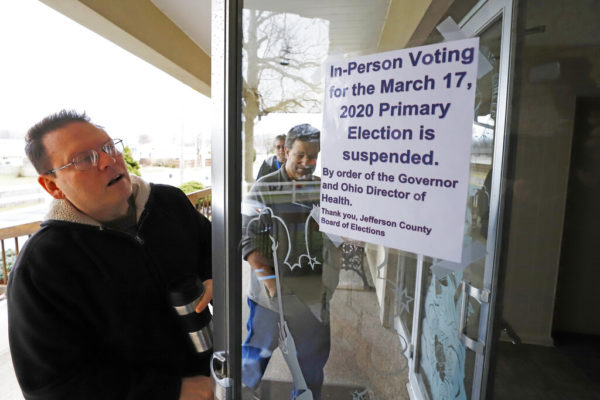The United States implemented dramatic new restrictions on Americans going out in public and 7 million people in the San Francisco area were put on a near-total lockdown to control the coronavirus emergency that has walloped the global economy. Not everyone was adhering to the clampdowns, however. On the same day that the Trump administration... Read More
MADISON, Wis. (AP) — A Minnesota man of Somali descent who was convicted of opening fire on other Somalis will get a new trial after a detective improperly testified that Somalis often lie to police, a Wisconsin appeals court ruled Tuesday. Ahmed Farah Hirsi was charged with multiple counts of attempted homicide and recklessly endangering... Read More
SAN DIEGO (AP) — Former California Republican Rep. Duncan Hunter was sentenced Tuesday to 11 months in prison after pleading guilty to stealing campaign funds and spending the money on everything from outings with friends to his daughter’s birthday party. The ex-Marine’s attorneys had asked for most or part of his sentence be spent in... Read More
OAKLAND, Calif. (AP) — A former San Francisco Bay Area tour operator was sentenced to four years in prison for serving as an unregistered agent for China’s Ministry of State Security in a scheme to use “dead drops” to pick up digital memory cards from a source and take them to China. Xuehua Edward Peng,... Read More
COLUMBUS, Ohio (AP) — Politicians of all stripes expressed frustration Tuesday after Ohio’s primary was postponed until June by the state’s elected officials amid concerns attendance at polling places would contribute to the coronavirus pandemic. The Ohio Democratic Party sued Tuesday afternoon over Secretary of State Frank LaRose’s decision to set a new date, saying... Read More
LOS ANGELES (AP) — A federal judge in Los Angeles handed a major victory to Katy Perry on Tuesday, overturning a jury’s verdict that found the pop superstar and her collaborators copied her 2013 hit “Dark Horse” from a 2009 Christian rap song. U.S. District Judge Christina A. Snyder said in her decision that the... Read More
NEW YORK (AP) — Coronavirus has become a “get out of jail” card for hundreds of low-level inmates across the country, and even hard-timers are seeking their freedom with the argument that it’s not a matter of if but when the deadly illness sweeps through tightly packed populations behind bars. Among those pleading for compassionate... Read More
PHILADELPHIA (AP) — The retrial of the only church official who has ever gone to prison in the Roman Catholic Church sex abuse scandal was delayed Monday because of the coronavirus outbreak. The retrial of Monsignor William Lynn, the longtime secretary for clergy in the Philadelphia archdiocese, had been to start Monday in Philadelphia Common... Read More
MERIDIAN, Miss. (AP) — A judge has been shot and critically wounded outside a courthouse in Mississippi, police said. Chancery Judge Charlie Smith was shot Monday morning in the parking lot outside the Lauderdale County Courthouse in downtown Meridian, WTOK-TV reported. Smith was getting out of truck to go inside the courthouse when the gunfire... Read More
EL PASO, Texas (AP) — U.S. immigration courts sharply scaled back operations Monday but have stopped well short of a total shutdown demanded by employees, including judges and government attorneys. Wearing face masks, about 30 asylum seekers who had been waiting in Mexico were escorted by authorities into a federal building in El Paso, Texas,... Read More
OAKLAND, Calif. (AP) — A San Francisco area judge ruled Monday that a transient who fatally stabbed an 18-year-old woman at a commuter train platform was sane at the time he committed the July 2018 murder. The Alameda County jury that found John Lee Cowell guilty last week in the murder of Nia Wilson and... Read More
SALT LAKE CITY (AP) — A California businessman accused of helping a pair of Utah polygamists expand a biodiesel fraud scheme that ended up stealing nearly $500 million in government funds was found guilty Monday on 10 counts including money laundering and mail fraud. The verdict against gas station owner Lev Dermen came despite his... Read More
BERKELEY, Calif. (AP) — Pacific Gas & Electric on Monday won court approval to raise $23 billion to help pay its bills over destructive California wildfires after Gov. Gavin Newsom dropped his opposition to a financing package designed to help the nation’s largest utility get out of bankruptcy. The milestone reached during an unusual court... Read More
FALLS CHURCH, Va. (AP) — A former Catholic priest in northern Virginia has been charged with sexually abusing a teenager in a case that dates back nearly 35 years, and a city councilman for the District of Columbia came forward to say he was the victim. Scott Asalone, 63, of Asbury Park, New Jersey, was... Read More
ENTERTAINMENT

March 18, 2020
Judge hands major win to Katy Perry in ‘Dark Horse’ dispute

March 16, 2020
Federal prosecutors in NYC add to R Kelly’s legal woes

March 13, 2020
A hospitalized Weinstein ‘has not given up,’ his lawyer says

Rapper Kodak Black pleads guilty to weapons charge in NY

Weinstein gets 23 years in sentence hailed by accusers
VIEW ALL
SPORTS

March 16, 2020
Ex-Canadian football player admits to college scam

March 13, 2020
Ex-track athletes detail alleged sex abuse by college coach

March 12, 2020
3 former track athletes suing NCAA, coach over alleged abuse

Ex-Michigan football player suing school over alleged abuse

Brian Urlacher’s brother pleads not guilty in gambling case
VIEW ALL
ARCHIVE FINDER
HOT POSTS
NEWSLETTER
TAGS
Abortion
Admissions Scheme
Amber Guyger
Archive
Asylum
Bill Cosby
Brett Kavanaugh
California
Catholic Church
Crime Watch Daily
Donald Trump
Drugs
Edward Gallagher
El Chapo
Eric Greitens
Facebook
Fraud
Guns
Harvey Weinstein
Illegal Immigration
Immigration
Jason Van Dyke
Jeffrey Epstein
Jussie Smollett
Laquan McDonald
Larry Nassar
Legal Smart
Marijuana
Michael Avenatti
Michael Cohen
Mohamed Noor
MSU
NFL
Nikolas Cruz
Opioids
Paul Manafort
PG&E
R. Kelly
Robert Mueller
Sexual Abuse
Shooting
Sports
Stormy Daniels
Supreme Court
Trump































































